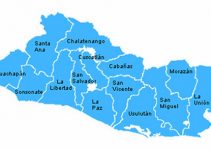Surely on more than one occasion, you’ve heard the word “guanaco“, primarily, as a way to distinguish or call the Salvadorans at home or outside our national borders. As well, it is interesting to know why Salvadorans tell us “guanacos” and the explanation origin of it.
First of all, we need to know that the “guanacos” are some animals that live in the region of the Andes in South America; these animals have the reputation of being lazy and less agile to run, in fact are small mammals animals and which are similar in appearance to the flames. Because of that, many Salvadorans get mad or disgusted they hear that Word, and call them that way.
A version says that, when Pedro de Alvarado arrived in El Salvador in the 16th century, (in the area between what is now Chalatenango and cabins) met some indigenous lencas, which were not very good for the physical work because they were lazy. For that reason, they were called “Chontal”.
After this, Pedro de Alvarado went to South American lands with the purpose to conquer lands of the Incas, and it was there where he met the animals called “guanacos”. When he returned to El Salvador, he made a comparison between indigenous people with these animals and changed the name of chontales to guanacos. For this reason, the word Stayed in the Cuscatleco lexicon.
There is also another version which that in pre-Columbian times, some groups of Indians did reunions which were called “conacastes” by the Maya and “guanacastes”
(Word in nahuatl: Huanacaxtle) by the Olmecs.
And precisely these meetings were made under the shade of big trees that today we know as “conacastes”.
The word guanaco at these meetings was used as a synonym for “brotherhood” (in language lenca poton guanaco means brotherhood).
Whatever the true version is, “guanaco” is demonym a typical word or name used to refer to Salvadorans.







I believe that it is a poton Lenca word and if its not I pronounce it a Lenca-Nawan word. It could derive from Guancasco (Lenka ceremony of peace treaty), Guaraguo (many Macaws), quechan loan word Huaca: you are a temple, or Nawan word: guaca-mol (sacred-sauce) guaca (sacred) & teoti-huacan (place where “g.o.d.” was born,,,) huacan: place of birth. Also another quechuan word wanaku (llama) Mayan Pipil Lencas were know for surprise attacks against the Spanish on dry parts of el Salvador hust ike the inde (“Apaches”), they stored water all over the desert to hold battle ground andime the guanaco (wanaku) camel they made sure the woman, elders and the children were safe while warriors fought of the extrimist Spanish striving (jihad)/Christians. So in conclusion ” they”, we are all of the above.
The denomyn “Guanaco” has nothing to do with the Quechua language. In the Eastern part of El Salvador, there was a tribe called the Lencas. In the Lencan language, “Guanaco” means “brotherhood.”
Simply because a word in two different languages are spelled/sound the same, that doesn’t mean they have the same meaning. Even scholars get confused with the meaning of “Guanaco” and link it to Peru. In Central America countries Salvadorans are called guanacos in an amicable/friendly manner. Salvadorans called themselves Guanacos.
Alvarado was defeated in El Salvador and was injured there. It took the Spaniards two years to conquer El Salvador. Further in the region of El Salvador and abroad, Salvadorans are known for being industrious and hard working.
Demonym, correction. In Quechua of Peru is actually spelled Wanaco, not Guanaco. Actually, the pronunciation and spelling are different.
You’re doing it correctly. The salvadoran demonyn is witten with capital G and the animal’s noun is spelled with lower case (Guanaco and guanaco). The Guanaco denomyn stuck with the salvadoran culture after-during the bonanza days of the production of balsamo and anil on the pacific coast. After harvesting these two naturally produced items they needed to be shipped to South America (Peru), and they would ship to Europe to use it in the pharmacy industry and fabric dyeing industries (before the invention of artificial coloring). Here is where the trader notice the comparison of the guanaco and the salvadoran workers loading the ships. The guanaco is territorial, curious, capable to survive with little food or maintenance, good footing for all terrains. It’ been known that sheep shepherds in the altiplanos have used guanacos in their herd as a form of security guards due to their peculiar behavior. So Guanaco = all terrain 4 x 4, hard worker. But now a day there a many that call themselves Guanacos but are more “pura vida”, you know what I mean…..
Further more, due to the heat in Centralamerica, meetings of brotherhood took place under an erormous tree that provides great shodow from the heat named in the region as Huanacaxtle (guanacaste). Thus, the term Guanaco is preconquest. Pedro de Alvarado reported to Hernan Cortez that he had reached the area of the Huanacastle. In fact, all countries of Central America were referred to as Guanacos during the conquest and after. Later the term Guanaco is used by Salvadorans.
Pronunciation of Guanaco in : Hua.na.co. (Lencan Potol language).
Peruvian pronunciation in Quechua: Wa.na.ko.
Quechua actually is Wanaku (Wana.ku).
Muy interesante
Nice work guys very informative tkx all
Mocha gracia a todos por Estes
A female of El Salvador can be called a Guanaca?
Yes!
Guanaco means Valley of the Hammocks or movers/shakers due to its frequent earthquakes near the San Salvador region. It’s Nautl from the Pipil tribe not Lenca from Honduras and Nicaragua.
Salvadorans are a great people. They are generally of short stature and have been compared to the South American guanaco for its short stature at approximately four feet in height. In Central American culture this is not seen as a derogatory reference or comparison. It is more intended as a light hearted colloquial term. Hurray for Guanacos!
Thank you Mario Lopez for the lesson!